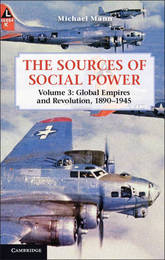
|
The Sources of Social Power: Volume 3, Global Empires and Revolution, 1890-1945
Hardback
Main Details
| Title |
The Sources of Social Power: Volume 3, Global Empires and Revolution, 1890-1945
|
| Authors and Contributors |
By (author) Michael Mann
|
| Physical Properties |
| Format:Hardback | | Pages:520 | | Dimensions(mm): Height 229,Width 152 |
|
| ISBN/Barcode |
9781107028654
|
| Classifications | Dewey:303.3 |
|---|
| Audience | | Tertiary Education (US: College) | | Professional & Vocational | |
|---|
|
Publishing Details |
| Publisher |
Cambridge University Press
|
| Imprint |
Cambridge University Press
|
| Publication Date |
17 September 2012 |
| Publication Country |
United Kingdom
|
Description
Distinguishing four sources of power - ideological, economic, military and political - this series traces their interrelations throughout human history. This third volume of Michael Mann's analytical history of social power begins with nineteenth-century global empires and continues with a global history of the twentieth century up to 1945. Mann focuses on the interrelated development of capitalism, nation-states and empires. Volume 3 discusses the 'Great Divergence' between the fortunes of the West and the rest of the world; the self-destruction of European and Japanese power in two world wars; the Great Depression; the rise of American and Soviet power; the rivalry between capitalism, socialism and fascism; and the triumph of a reformed and democratic capitalism.
Author Biography
Michael Mann is Distinguished Professor of Sociology at the University of California, Los Angeles. He is the author of Power in the 21st Century: Conversations with John Hall (2011), Incoherent Empire (2003) and Fascists (Cambridge, 2004). His book The Dark Side of Democracy (Cambridge, 2004) was awarded the Barrington Moore Award of the American Sociological Association for the best book in comparative and historical sociology in 2006.
Reviews'Mann's epic multi-volume series is the most illuminating analysis ever written on world history. Volume 3 sets a new standard in explaining why modern empires ranged from indirect to blatant and the causes of the Great Depression, of fascism, and of Japanese aggression. He is masterful in assessing the degree of contingency vis-a-vis structural tendencies in the turning points of the twentieth century.' Randall Collins, University of Pennsylvania 'Michael Mann's great project - a study of shifts in power throughout history - is breathtaking in scope and ambition, and his third volume, which analyzes on a global scale the devastating epoch of the two world wars, is simply stunning, sparkling with insight and originality throughout - a magnificent tour de force.' Sir Ian Kershaw, University of Sheffield 'Michael Mann's The Sources of Social Power brings social science analysis and the writing of history together in a new and highly original way. Based on decades of comprehensive scholarship, this volume offers a fascinating synthesis of the world's history in the first half of the twentieth century. Full of new insights and rich in comparison, it is going to change many commonly held views. It deals with capitalism and class; the wars and depression; fascism, communism, and democracy, as well as with ideology and political power, racism and globalization, and the rise and fall of Europe's dominance in the world. It identifies the major trends and causes but has also much sense for the contingent constellations of which history is full: an outstanding achievement, a major event, a masterpiece in the Weberian tradition of historical sociology.' Jurgen Kocka, Free University of Berlin 'Volume 3 of Michael Mann's magisterial The Sources of Social Power displays all the virtues we have come to expect from this author: theoretical finesse, encyclopedic knowledge, clear exposition, unfailingly good judgment, and an allergy to all forms of cant. In my opinion, The Sources of Social Power is one of the truly great works of social science - and of world history - to appear in recent decades.' William H. Sewell, Jr, University of Chicago 'Mann comes closer to his 'history of power in human societies' in these two volumes than in the previous ones. It is hard to think of other works of this scope by social scientists. ... Readers looking for something like a truly global history of power over the past century and a half will find much to ponder here. The overarching result is predictable, considering the author: Mann tackles these topics masterfully. He explains each development with elan, sometimes upending dominant interpretations and often pushing at the edges of received wisdom ... These last two volumes, along with the previous two, will be read and reread for generations to come.' Julian Go, International Affairs
|